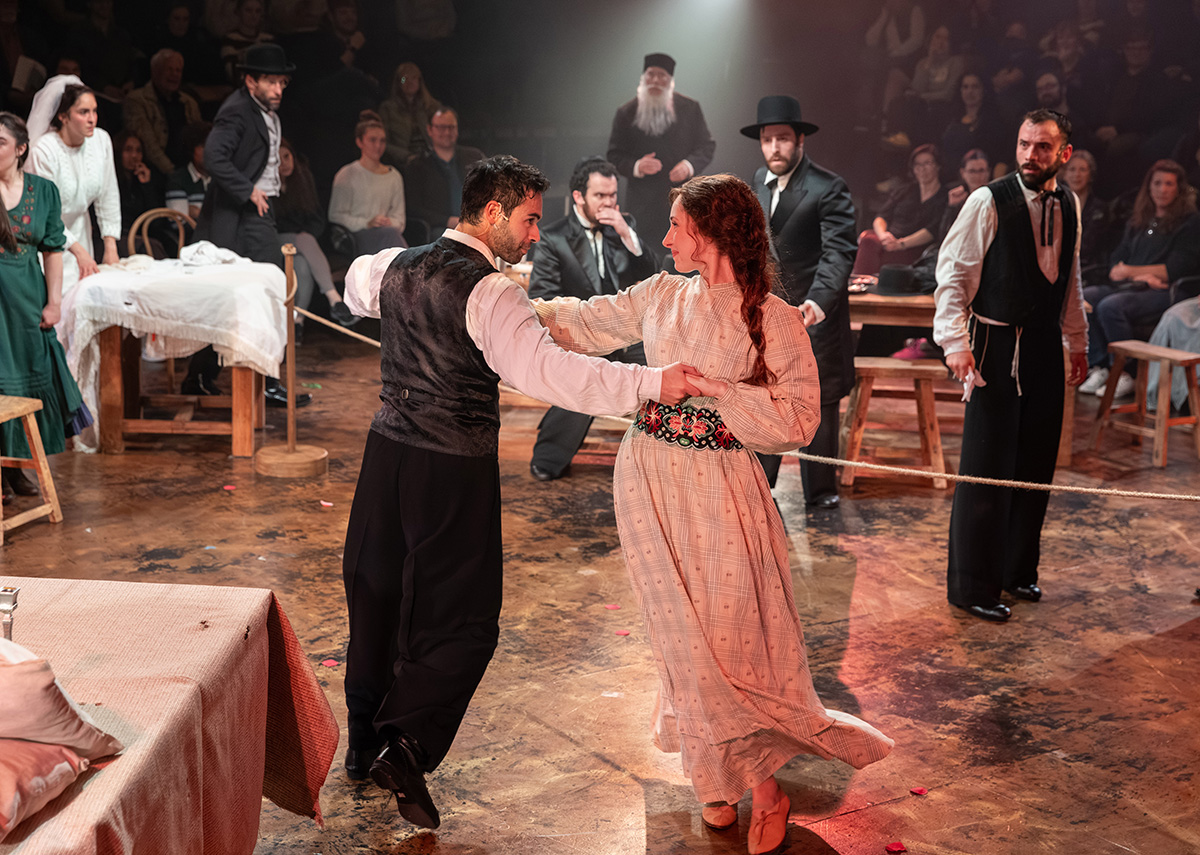Theater
A busy season underway in local theater scene
Something for everyone indeed

“Something for everyone.” It’s a tired tagline, but in the case of this fall’s DMV theater season, it happens to be pretty much true. And a lot of the work is queer, directly or tangentially. Here’s a sliver of what’s already opened and what’s in store.
Theater J jumps into the new season with “How to Be a Korean Woman” (through Sept. 22), Sun Mee Chomet’s comic and heartfelt telling of searching for her birth family in Seoul, South Korea. edcjcc.org
Woolly Mammoth Theatre opens with “The Comeuppance” (through Oct. 6), the latest work from Tony-winning out playwright Branden Jacobs-Jenkins.
“On the night of their 20th high school reunion, the self-proclaimed “Multi-Ethnic Reject Group” reconnects while they pregame in Prince George’s County, Md. But amid the flow of reminiscing, an otherworldly presence forces these former classmates to face the past head-on and reckon with an unknowable future.” Woollymammoth.net
Signature Theatre kicks off with the D.C. premiere of Eboni Booth’s Pulitzer-winning play “Primary Trust” (through Oct. 20). Booth’s contemporary humor-filled tender tale of self-discovery and connection is followed by Signature’s big musical “A Funny Thing Happened on the Way to the Forum” (Oct. 29-Jan. 12), Stephen Sondheim’s classic Roman-set musical comedy staged by Signature’s out artistic director Matthew Gardiner. Sigtheatre.org
GALA Hispanic Theatre’s season opener, Gustavo Ott’s “The 22+ Weddings of Hugo” (through Sept. 29), is based on a true story. Performed in Spanish with easy-to-follow English surtitles, Ott’s raucous tale seeks to cover the various scenarios immigrants experience through many weddings. The cast features out actors Carlos Castillo as Hugo, a quiet postal clerk, and Victor Salinas who plays Elmar, a gay writer seeking refuge. José Zayas directs. Galatheatre.org.
Mosaic Theater Company at Atlas Performing Arts Center presents “Lady Day at Emerson’s Bar and Grill” (through Oct. 6), a play with music about jazz legend/queer icon Billie Holiday starring Roz White. Mosaic’s out artistic director Reginald L. Douglas directs. Mosaictheater.org
Ford’s Theatre presents “Mister Lincoln” (Sept. 20-Oct. 13), a “witty and revelatory” one-man show starring Scott Bakula (stage and screen actor famous for TV’s “Quantum Leap”). Fords.org
ExPats Theatre (also housed at Atlas) opens with “Marlene” (Sept. 28 through Oct. 20) featuring Karin Rosnizeck as the legendary Dietrich, a great star who famously defied social and gender conventions while dazzling the world with her glamorous career. Expatstheate.com
There’s a lot on offer at George Mason University’s Center for Arts this autumn, not least of all “An Evening with Lea Salonga” (Saturday, Sept. 28).
Tony-winning singer and actress Lea Salonga headlines the 2024 ARTS by George! benefit concert, performing songs from a four-decade career on Broadway and in animated movie hits. Born in the Philippines, Salonga originated the lead role of Kim in Miss Saigon, and she was the first Asian cast member to perform the role of Eponine in Les Misérables on Broadway.
Other promising one-day-only GMU entertainments include Ballet Hispánico (Oct. 5) and Mark Morris Dance Group and Music Ensemble (Oct. 19). cfa.gmu.edu
Creative Cauldron in Falls Church presents “Sondheim Tribute Revue” (Oct. 3-27) a celebratory salute to musical giant Stephen Sondheim with eight performers singing 20 titles from the gay composer’s brilliant songbook including “Company,” “Follies,” “Into the Woods,” “A Little Night Music,” “Sweeney Todd,” and the recent Tony Award Winner, “Merrily We Roll Along,” and more. Creativecauldron.org
Olney Theatre explores what makes a president great with “Eisenhower: This Piece of Ground,” Sept. 27-Oct. 20. And for Disney fans, don’t miss “Frozen,” Oct. 24-Jan. 5. Olneytheatre.org
The Kennedy Center offers laughs and nostalgia with “Clue” (Sept.17 through Oct. 6), a whodunit based on the fan-favorite 1985 Paramount movie and inspired by the classic Hasbro board game. Next up is “The 25th Annual Putnam County Spelling Bee” (Oct. 11 – 20).
Other Kennedy Center treats include “An Evening with David Sedaris” (Oct. 15). The gay humorist is slated to share his inimitable brand of satire and hilarious observations, and then it’s out sound healing artist Davin Youngs with “The Reset” (Oct. 28), his take on a “sound bath” including improvisational singing, looping devices, and healing instruments. Kennedy-center.org
Fall is the best time at the beach, so plan a weekend in Rehoboth and visit the phenomenal Clear Space Theatre. “Venus in Fur” runs Sept. 19-29 followed by “Sweeney Todd” Oct. 11-27; and “Shrek” runs Nov. 8-10. Clearspacetheatre.org
Fall cabaret will be in full swing at the Gay Men’s Chorus of Washington, D.C., as soloists share heart-warming stories and songs about their travel adventures (Oct. 19 at 2, 5, and 8 p.m.). And, of course, no holiday season is complete without the Chorus’s annual holiday celebration set for Dec. 7, 14, and 15. Gmcw.org
Folger Theatre presents Shakespeare’s “Romeo and Juliet” (Oct. 1-Nov. 10) staged by inspiring out director Raymond O. Caldwell. A large, versatile cast features Cole Taylor and Caro Rayes Rivera as the star-crossed lovers, and a host of familiar local faces including Luz Nicolas, Deirdra LaWan Starnes, and out actor Fran Tapia as Lady Capulet. folger.edu
Studio Theatre serves up “Summer, 1976,” (opening Nov. 13), a memory play by Pulitzer Prize-winning playwright David Auburn (“Proof”). Directed by Vivienne Benesch, the two-hander features longtime D.C. favorites Kate Eastwood Norris and out actor Holly Twyford playing disparate women whose unlikely friendship and ensuing connection changes the course of their lives. Studiotheatre.org
And on Wednesday, Dec. 4, Strathmore in North Bethesda presents “A Swingin’ Little Christmas,” a fun takeoff on kitschy, classic ‘50s and ‘60s holiday specials, featuring out TV star Jane Lynch (“Glee,” “The Marvelous Mrs. Maisel”) alongside Kate Flannery (“The Office”), Tim Davis (“Glee’s” vocal arranger), and The Tony Guerrero Quintet. Strathmore.org
Theater
Ford’s ‘First Look’ festival showcases three new productions
A chance to enjoy historical dramas for free before they’re completed

The Ford’s Theatre Legacy Commissions: A First Look – 2026
Jan. 16 & 17
Ford’s Theatre
511 Tenth St., N.W.
FREE
Fords.org
When Ford’s Theatre debuted its new plays festival, “A First Look,” in 2023, it was unclear whether people would come for the staged readings.
“Before the pandemic if you announced the reading of a play, 12 people might show up,” says José Carrasquillo, director of artistic programming at Ford’s Theatre. “Since then, we’ve experienced comparatively massive turnout. Maybe because it’s cheap, or because of the very newness of the works.”
This year’s fourth edition showcases readings of three pieces currently in varied stages of development. The free, two-day festival offers audiences a chance to encounter historical dramas long before they’re completed and fully produced. None are finished, nor have they been read publicly. And befitting the venue’s provenance, the works are steeped in history.
The festival kicks off with “Springs” by playwright Jeanne Sakata and directed by Jessica Kubzansky. Commissioned by The Ford’s Theatre Legacy Commissions, it’s the both epic and personal story of Sakata’s Japanese American family including her grandfather’s experience in an internment camp.
“Sakata’s immigrant grandfather was an exceptionally skilled farmer who helped to stave off starvation in the camp. Still, he never gave up on the idea that he belonged in America. It’s very much a story of today,” says Carrasquillo.
Unlike “Springs,” the festival’s two other works weren’t commissioned by Ford’s. But they both fit the history brief and likely will benefit from the exposure and workshopping.
“Providence Spring,” by California based playwright Richard Helesen and directed by Holly Twyford, portrays Clara Barton (played by local favorite Erin Weaver) as a hero beyond the Red Cross whose then-radical initiatives included cataloguing the Civil War dead, many pulled from mass graves.
Directed by Reginald L. Douglas, “Young John Lewis: Prodigy of Protest” explores a slice from the life of the legendary civil rights activist and longtime congressman. With book and lyrics by Psalmayene 24 and music by Kokayi this collaboratively staged reading between Ford’s and Mosaic Theater is slated to premiere fully produced at Mosaic as a 90-minute musical in the spring of 2026.
“When I was hired at Ford’s in 2018, we began discussing hiring writers who do historical drama,” says Carrasquillo. “Our intention was resolute, but we didn’t do it right away. It took getting through the pandemic to revisit the idea.”
At the same time, the racial reckoning spurred Ford’s to hire playwrights of color to tell stories that had previously been forgotten or ignored.
For Carrasquillo, who is gay, the impulse to commission was crystalized when he saw the film “Hidden Figures,” a true story about “three brilliant African-American women — at NASA during the Space Race, overcoming racial and gender discrimination to make crucial contributions to America’s spaceflight success.” He says, “the film floored me. How many stories like this are there that we don’t know about?”
One of the festival’s happiest experiences, he adds, was the commission of playwright Chess Jakobs’s “The American Five” and its subsequent success. It’s the story of Martin Luther King Jr. and his inner circle, including Bayard Rustin (MLK’s brilliant, unsung gay adviser) leading up to the 1963 March on Washington. The play later premiered fully produced in Ford’s 2025 season.
Increasingly, the readings at Ford’s have become popular with both artists and audiences.
At Ford’s, Carrasquillo wears many hats. In addition to selecting plays and organizing workshops, he serves as an in-house dramaturg for some of the nascent works. But he’s not alone. Also helming the festival are senior artistic advisor Sheldon Epps, and The Ford’s Theatre Legacy Commissions advisor Sydné Mahone.
Because the plays are in development, comments from directors, dramaturgs, and the audience are considered and may become part of the playwrights’ rewrites and changes. If and when the play resurfaces fully produced, audience members might find their suggestion in the completed work.
Is this year’s festival queer influenced? Yes, both by those involved and the topics explored.
Carrasquillo explains, “While Sakata’s “Springs” is primarily about immigration, its message is relevant to the queer community. Civil rights are being taken away from us. We need this playwright’s story to know what has happened and what can happen to any of us.
“Many of Ford’s legacy commissions underscore the importance of civil rights in our country and that’s important to all of us. Queer and not queer.”

It’s been a year filled with drama and music, re-imaginings and new works. There was a lot on offer in 2025, and much to enjoy. Here are 10 now-closed productions that come to mind.
On Valentine’s Day at Folger Theatre on Capitol Hill, out actor Holly Twyford served as narrator for “The Love Birds” a Folger Consort work that melds medieval music with a world-premiere composition by acclaimed composer Juri Seo and readings from Geoffrey Chaucer’s “A Parlement of Foules”
Standing behind a podium, Twyford beautifully read Chaucer’s words (translated from Middle English and backed by projected slides in the original language), alternating with music played on old and new instruments.
While Mosaic Theater’s “A Case for the Existence of God,” closed in mid-December, it’s proving a production not soon forgotten. Precisely staged by Danilo Gambini, and impressively acted by Lee Orsorio and Jaysen Wright, the soul-searching two hander by out playwright Samuel D. Hunter, tells the story of two men who form an unlikely friendship based on single-fatherhood, a specific sadness, and hope.
The action unfolds in a small office in southern Idaho, where the pair discuss the perplexing terms of a mortgage loan while delving deep into their lives and backgrounds. Nothing is left off the table.
Shakespeare Theatre Company’s spring production of “Uncle Vanya” gave audiences something both fresh yet enduring. Staged by STC’s artistic director Simon Godwin, the production put an impeccably pleasing twist on Russian playwright Anton Chekhov’s classic. It ranks among the very best area productions of the year.
Featuring a topnotch cast led by Hugh Bonneville (TV’s “Downton Abbey”) in the title role, the play was set on an unfinished stage cluttered with costume racks and assorted props, all assembled by crew uniformed in black and actors in street clothes. Throughout the drama tinged with comedy, the actors continued to assist with ever increasingly period set changes accompanied by an underscore of melancholic cello strings. It was innovative and wonderful.
GALA Hispanic Theatre’s production of Manuel Puig’s “Kiss of the Spider Woman” was an intimate and affecting piece of theater. Staged by José Luis Arellano, it starred out actors Rodrigo Pedreira and Martín Ruiz as two very different men whose paths cross as convicts in an Argentine prison.
Arena Stage scored with a re-imagined and updated take on the widely liked musical “Damn Yankees.” Directed by Sergio Trujillo, the Broadway bound production has been “gently re-tooled for its first major revival in the 21st century,” moving the action from the struggling Washington Senators baseball team to the turn-of-the-century Yankees lineup. Ana Villafañe’s charmingly seductive Lola and a chorus of fit ball players made for a good time.
Also at Arena, out playwright Reggie D. White’s new work “Fremont Ave.” was very well received. A semi-autobiographical glimpse into home and the many definitions of that idea specifically relating to three generations of Black men, the work boasts a third act with a deeply queer storyline to boot.
Before his smash hit “Hamilton” transformed Broadway, Lin-Manuel Miranda wrote “In the Heights,” a seminal musical set against the vicissitudes of an upper Manhattan bodega. Infused with hip-hop, rap, and pop ballads, the romance/dramedy takes place over a lively few days in the vibrant, close-knit Latin neighborhood, Washington Heights.
Signature Theatre’s exciting take on “In the Heights” featured a talented cast including out actor Ángel Lozado as the bodega owner who figures prominently in the barrio and the action.
Studio Theatre’s recent production of lesbian playwright Paula Vogel’s newest work “The Mother Play,” a drama with humor, is about a well put together alcoholic mother and her two gay children living under difficult circumstances in the less glitzy parts of suburban Maryland. With nuanced performances and smart direction, the production was terrific.
Keegan Theatre surpassed expectations with its production of “Lizzie” a punk rock opera about Miss Borden, the fabled axe wielding title character. Performed by a super all-female cast, they belted a score that hits hard on subjects like money, queerness, and strained (to say the least) family relationships.
Round House Theatre impressed autumn audiences with “The Inheritance,” a two-part drama sensitively staged by out director Tom Story and acted by a mostly queer cast that included young actor Jordi Bertrán Ramírez in a breakout performance.
Penned by out playwright Matthew López, the epic work inspired by E.M. Forster’s novel “Howards End,” explores themes of love, legacy, and the AIDS crisis through the lives of three generations of gay men in New York City.
Prior to opening, Story commented that with the production’s predominately queer cast you get actors who “really understand the situation, the humor, and the struggle. It works well.” And he was right.
Theater
Out actor talks lead role in ‘Fiddler on the Roof’
Signature Theatre production runs through Jan. 25

‘Fiddler on the Roof’
Through Jan. 25
Signature Theatre
4200 Campbell Ave.
Arlington, Va.
Tickets start at $47
Sigtheatre.org
Out actor Ariel Neydavoud is deep into a three-month run playing revolutionary student Perchick in the beloved 1964 musical “Fiddler on the Roof” at Signature Theatre in Arlington. And like his previous gigs, it’s been a learning experience.
This time, he’s gleaning knowledge from celebrated gay actor Douglas Sills who’s starring as the show’s central character Tevya, a poor Jewish milkman in the fictional village of Anatevka in tsarist Russia circa 1905.
In addition to anti-Semitism and expulsion, Tevya is struggling with waning traditions in a changing world where his daughters dare suggest marrying for love. Daughter Hodel (Lily Burka) falls for Perchick, an outsider who comes to town brandishing new ideas.
And along with its compelling and humor filled storyline, “Fiddler” boasts iconic numbers like “If I Were a Rich Man,” “Tradition,” “Matchmaker, Matchmaker,” and “Sunrise, Sunset.”
Neydavoud, born and raised as an only child in the West Los Angeles neighborhood lightheartedly referred to as Tehrangeles (due to the large Iranian-American population), has always been passionate about performing. “It’s like I came out of the womb tap dancing,” he says. Fortunately, his mother, an accomplished pianist and composer, served as built-in accompanist.
He began acting and singing at kid camps and a private Jewish middle school alongside classmate Ben Platt. In his teens, Neydavoud spent three glorious weeks at Stagedoor Manor, a well-known theater camp in Upstate New York, where he solidified his desire to pursue theater as a profession, and started to feel comfortable with being queer.
Following high school, he studied at AMDA (American Musical and Dramatic Academy) and soon after morphed from theater student to professional actor.
WASHINGTON BLADE: Your entry into showbiz seems to have been a smooth one.
ARIEL NEYDAVOUD: I’m happy to hear it seems that way. I’d rarely describe anything about this profession as smooth; nonetheless, what I love about this work is that it gives opportunities to have so many new experiences: new shows, new parts, and new communities who come together in a moment’s notice purely for the sake of creating art.
BLADE: Tell us about Perchick.
NEYDAVOUD: He comes to Anatevka and challenges their ideals and way of life. That’s something I can relate to.
I’m Jewish on both sides, but I’m also queer, first generation American, [his mother and father are from Germany and Iran, respectively], and a person of color. I never feel like I belong to a single community. That’s what has emboldened my inner activist to speak up and challenge ideas that I don’t necessarily buy into.
BLADE: You sing beautifully. Perchick’s song is “Now I have Everything,” an Act II melody about finding love. Was it an instant fit for you?
NEYDAVOUD: Not instantly.I’m traditionally a first tenor. Perchick is baritone range, a little outside of my comfort zone. After being cast, I asked our director Joe Calarco if he would be comfortable raising the key, something they did with the recent Broadway revival. He was firm about not doing that.
As an artist I see challenges as opportunities to grow, so it’s been really good exploring my lower register.
BLADE: Audiences have commented on an intimacy surrounding this production.
TK: It’s performed in the round with a dining table at its center. It could be a sabbath or seder table, however you interpret it, but I find it a brilliant way to illustrate community and tradition.
It feels like the audience is invited to the table and join the residents of Anatevka. The show’s moments of joy like the betrothal song “To Life (L’Chaim)” are intensified, and conversely the pogrom scenes are made more difficult. It feels like we’re sharing space.
BLADE: Do your encompassing identities broaden casting possibilities for you?
NEYDAVOUD: Marketing yourself as ethnically ambiguous can be a helpful tool. After “Hamilton” and the pandemic there was more of a shift toward authenticity. I try to steer toward playing Middle Eastern, Southwest Asian, Jewish, and mixed-race characters without being too prescriptive.
BLADE: Tell us your dream roles?
NEYDAVOUD: I’d love to play the Emcee in Cabaret [often portrayed as a gender-fluid, queer-coded, or non-binary figure]. And I’d like to direct a production of “Godspell” with a fully Middle Eastern cast. I think portraying Jesus and disciples in Middle Eastern bodies as Bohemian idealists living under an oppressive regime could be especially impactful.
BLADE: Can today’s queer audiences relate to life on the shtetl?
NEYDAVOUD: As a piece, “Fiddler” is timeless. Beyond the magical score, it hits home with just about anyone who’s ever felt othered. There are relevant themes of displacement and persecution, and maintaining cultural identity in the wake of turbulence, all ideas that tend to resonate with queer people.


















